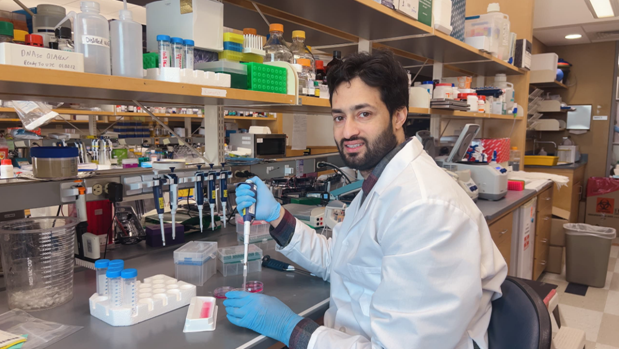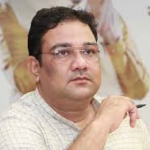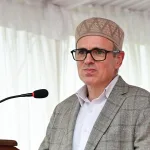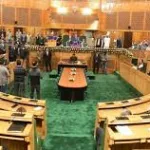Kashmir-born scientist Dr. Shahid Banday, a researcher at the Howard Hughes Medical Institute (HHMI) Lab at UMass Chan Medical School in Boston, USA, has made a groundbreaking discovery in the fight against Ewing Sarcoma (ES), a rare and aggressive bone and soft tissue cancer primarily affecting children and young adults. After five years of intensive research, Dr. Banday and his colleagues published a pivotal study in Springer Nature Communications, titled “The O-glycosyltransferase C1GALT1 promotes EWSR1::FLI1 expression and is a therapeutic target for Ewing sarcoma.”
This milestone research uncovers a critical mechanism driving the growth of ES tumors, identifying C1GALT1 as a potential therapeutic target. Dr. Banday’s work opens the door to innovative treatments that could dramatically improve survival rates for ES patients, marking a significant step forward in cancer research.
Ewing sarcoma is an aggressive malignant bone and soft tissue tumor that primarily affects children and young adults. A characteristic feature of the tumor is a spontaneous mutation that results in the formation of an oncogenic fusion protein, most frequently EWS-FLI1. The EWS-FLI1 oncoprotein is essential for tumor cell survival and drives cancer progression.
Targeting Specific Protein
“I decided to explore different strategies for targeting a specific protein. Currently, there are various approaches available, including siRNA, RNAi, small molecules, T-cells, and other methods. However, upon further investigation, we and other groups discovered that the fusion gene produces a transcription factor. Transcription factors are proteins that enter the cell’s nucleus and bind to various genes, either increasing or decreasing their expression. Interestingly, this gene doesn’t have a specific function or phenotype, but it reprograms the cell’s entire genome by binding to different genes and regulating their expression.” Dr Shahid said.
Besides, he said, Transcription factors are notoriously difficult to target. Typically, proteins have a distinct pocket where drugs can bind, much like a lock and key. However, this transcription factor lacks such a pocket, making it resistant to targeting with small molecules or other drugs. Given this challenge, I decided to take a step back and focus on targeting the mechanisms responsible for the formation of this fusion protein. Since this protein is not present in normal cells, targeting its formation could provide a therapeutic target for cancer treatment. Our previous studies have shown that targeting this fusion protein out can lead to cell death, demonstrating the proof of concept. Therefore, I aimed to investigate the different mechanisms regulating this protein, which could provide a novel approach to cancer therapy.
Dr. Banday has developed an innovative approach to identify small molecule drugs that inhibit such undruggable oncoproteins, including EWS-FLI. Dr. Banday conducted a genetic CRISPR screen to pinpoint the factors and pathways required for the expression of EWS-FLI1, with the goal of finding highly druggable targets. Based on this information, the team then seeks to identify small molecule inhibitors of these druggable factors and pathways.
Using this approach, they identified a novel and highly druggable protein essential for EWS-FLI1 expression: C1GALT1.Furthermore he identified a well-characterized, potent small molecule inhibitor of C1GALT1—Itraconazole (ITZ)—which was first approved by the US Food and Drug Administration (FDA) almost 30 years ago and is still in use today to treat a non-cancer-related pathogenic condition. Moreover, ITZ is known to be extremely safe and non-toxic.
In pre-clinical studies, Dr. Banday’s and his collages found that treating cultured human Ewing sarcoma cells with ITZ reduced EWS-FLI1 levels, effectively killing the cancer cells while leaving normal, non-cancerous cells unaffected. Most importantly, the inhibitor potently suppressed the growth of Ewing sarcoma tumors in mice. In fact, they found that ITZ not only halted tumor growth but also caused the tumors to regress.
These findings are highly promising, and Dr. Banday and his team are excited about the potential for developing ITZ as a drug to treat Ewing sarcoma. They have filed an international and US patent for this drug as a treatment for ES. Given that ITZ is FDA-approved and known to be safe and well-tolerated, Dr. Banday is currently working with Dr. Mathew Hamming, a renowned scientist in the field of sarcomas, and they are collaborating with different research groups throughout the USA. Together, they are exploring options to advance ITZ directly into clinical trials for Ewing sarcoma.
The Hidden Threat of Sarcomas: A Call for More Research
Sarcomas are among the rarest and most enigmatic forms of cancer, accounting for just 1% of all adult cancer diagnoses. Despite this small proportion, sarcomas encompass over 100 distinct subtypes, each originating from a variety of tissues, including muscle, bone, connective tissue, blood vessels, and fat. Despite their diversity, sarcomas remain poorly understood, with their origins and causes largely unknown.
What makes sarcomas particularly challenging is the lack of effective systemic therapies for many of these subtypes. Patients with sarcoma often face limited treatment options, and survival rates for certain forms remain dishearteningly low. The urgent need for better diagnostic tools and more effective treatment strategies has never been clearer.
In 2024, the U.S. is expected to see approximately 13,590 new cases of soft tissue sarcoma and 5,200 deaths from this disease. As of 2021, over 167,000 people in the U.S. were living with sarcoma. In India, while the incidence of sarcoma is lower, this is not necessarily due to a lower prevalence but rather the result of limited diagnostic capabilities. However, with advances in diagnostic technology, the incidence of sarcomas in India is rising. Still, comprehensive data on the prevalence of sarcomas in India remains scarce, highlighting challenges in awareness, early detection, and disease reporting.
Data from the National Cancer Registry Programme (1982–2011) shows a steady increase in the incidence of Ewing’s Sarcoma (ES) across major cities in India, including Bangalore, Mumbai, Chennai, Bhopal, and Delhi. Despite this growing trend, there remains a lack of focused research on the clinical and molecular aspects of ES within the Indian population. Understanding the disease’s epidemiology, genetic factors, and treatment responses in India is essential for improving early detection and developing region-specific, more effective treatment strategies.
The growing burden of sarcomas, particularly Ewing’s Sarcoma, underscores the critical need for more dedicated research to unlock better treatments and improve outcomes for patients worldwide.
Repurposing Drugs: A Faster Path to Effective Treatment
Developing a new drug is an arduous journey that can take years, often spanning over a decade, with extensive testing, trials, and regulatory approvals. This lengthy process typically involves numerous preclinical studies and rigorous safety checks. However, a promising alternative, known as drug repurposing, allows researchers to speed up the process. By exploring existing drugs that are already approved for other conditions, researchers can bypass many of the time-consuming steps involved in creating new drugs. With established safety profiles, repurposed drugs can move into clinical trials more swiftly, offering a fast-track to treatments for urgent medical needs. This approach is a game-changer, especially when addressing health crises in record time.
Dr. Shahid, a leading researcher, is utilizing innovative techniques like broad profiling and functional genomics to understand the mechanisms behind various cancers. “We are identifying small molecules that can potentially target these cancers, using our deep understanding of their underlying causes,” Dr. Shahid said. This research has already led to breakthroughs, including identifying bestatin as a promising treatment for ovarian cancer (Cell Reports 2023), targeting WNK1 in blood cancer (Cell Reports 2024), and exploring the inhibition of Rho-associated kinases as a strategy to reactivate the FXN gene in Friedreich’s Ataxia (JNeurosci 2025).
In addition to these discoveries, Dr. Shahid and his colleagues are also focusing on other critical health issues, including gastrointestinal (GIST) carcinoma, which has a notably high prevalence in Kashmir. “We normally see a lot of gastrointestinal carcinoma in Kashmir,” Dr. Shahid shared. “The region’s high rates of the disease are attributed to factors such as dietary habits, genetic predispositions, and environmental influences. The consumption of heavily salted foods is believed to contribute to this increased risk. Due to limited early detection and screening, the cancer is often diagnosed at advanced stages. Given its rising incidence, there is an urgent need for focused research to identify the root causes and develop effective prevention and treatment strategies for the Kashmir population.”
(Author is Online Editor, Rising Kashmir)








